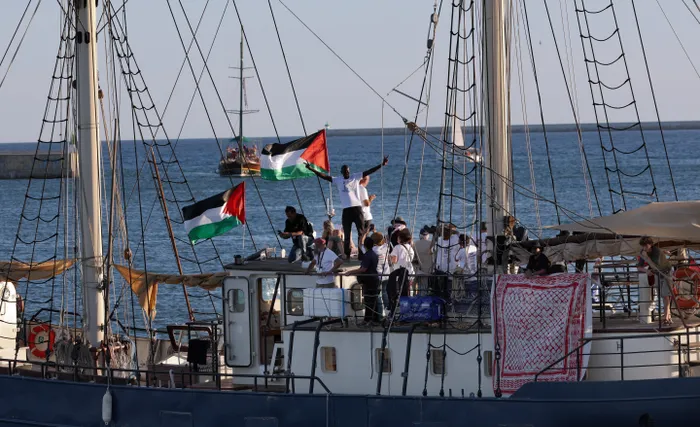
The first vessel "Sirius" of a civilian flotilla, carrying pro-Palestinian activists and humanitarian aid and aiming to break the Israeli blockade of the Gaza Strip, leaves the Barcelona.
Image: Lluis GENE / AFP
The safe return of Mandla Mandela and his fellow South African activists from Israeli detention has brought immense relief to their families and supporters. Yet their ordeal demands far more than quiet celebration. It calls for accountability and clarity on how humanitarian workers came to be detained while engaging in a peace-driven mission.
Their safe return, however, cannot be the end of the story. It must mark the start of a serious conversation about how humanitarian work in conflict zones is being criminalised and what protection South African citizens can expect when acting in good faith abroad.
The Global Sumud Flotilla, of which Mandela was a part, sought to deliver aid to Gaza and to draw attention to the continuing blockade that has left millions trapped in hardship. Whatever one’s views on the tactics of such missions, their intent was humanitarian, not hostile. The detention of activists attempting to ease suffering raises fundamental questions about Israel’s treatment of international aid efforts and about the global community’s tolerance for such actions.
South Africa’s Department of International Relations and Cooperation deserves credit for its swift diplomacy in securing the group’s release. But this moment also tests the country’s long-standing foreign policy position: a commitment to justice, dialogue and the defence of human rights, even when it places us at odds with powerful nations.
Mandela’s involvement, and his family’s dignified response, remind South Africans that solidarity with the oppressed is part of our national conscience. Yet solidarity cannot exist without accountability. Israel must be pressed to explain the circumstances of the detention and to respect the rights of those acting in the name of peace.
As South Africans, we know too well the pain of injustice and the value of global solidarity. Our government must therefore ensure that this incident does not fade into diplomatic silence. The principle at stake is simple: humanitarian work should never be treated as a crime.